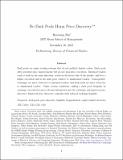| dc.contributor.author | Zhu, Haoxiang | |
| dc.date.accessioned | 2014-06-30T14:03:55Z | |
| dc.date.available | 2014-06-30T14:03:55Z | |
| dc.date.issued | 2013-12 | |
| dc.identifier.issn | 0893-9454 | |
| dc.identifier.issn | 1465-7368 | |
| dc.identifier.uri | http://hdl.handle.net/1721.1/88124 | |
| dc.description.abstract | Dark pools are equity trading systems that do not publicly display orders. Dark pools offer potential price improvements but do not guarantee execution. Informed traders tend to trade in the same direction, crowd on the heavy side of the market, and face a higher execution risk in the dark pool, relative to uninformed traders. Consequently, exchanges are more attractive to informed traders, and dark pools are more attractive to uninformed traders. Under certain conditions, adding a dark pool alongside an exchange concentrates price-relevant information into the exchange and improves price discovery. Improved price discovery coincides with reduced exchange liquidity. | en_US |
| dc.language.iso | en_US | |
| dc.publisher | Oxford University Press | en_US |
| dc.relation.isversionof | http://dx.doi.org/10.1093/rfs/hht078 | en_US |
| dc.rights | Creative Commons Attribution-Noncommercial-Share Alike | en_US |
| dc.rights.uri | http://creativecommons.org/licenses/by-nc-sa/4.0/ | en_US |
| dc.source | SSRN | en_US |
| dc.title | Do Dark Pools Harm Price Discovery? | en_US |
| dc.type | Article | en_US |
| dc.identifier.citation | Zhu, H. “Do Dark Pools Harm Price Discovery?” Review of Financial Studies 27, no. 3 (March 1, 2014): 747–789. | en_US |
| dc.contributor.department | Sloan School of Management | en_US |
| dc.contributor.mitauthor | Zhu, Haoxiang | en_US |
| dc.relation.journal | Review of Financial Studies | en_US |
| dc.eprint.version | Author's final manuscript | en_US |
| dc.type.uri | http://purl.org/eprint/type/JournalArticle | en_US |
| eprint.status | http://purl.org/eprint/status/PeerReviewed | en_US |
| dspace.orderedauthors | Zhu, H. | en_US |
| dc.identifier.orcid | https://orcid.org/0000-0001-5330-3441 | |
| mit.license | OPEN_ACCESS_POLICY | en_US |
| mit.metadata.status | Complete | |
